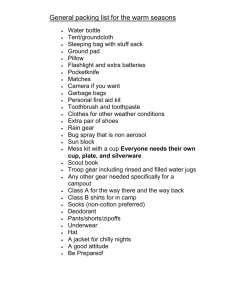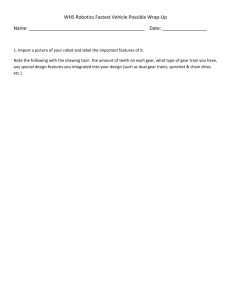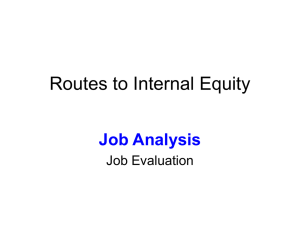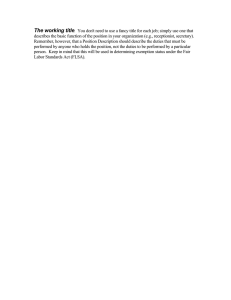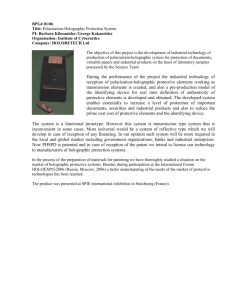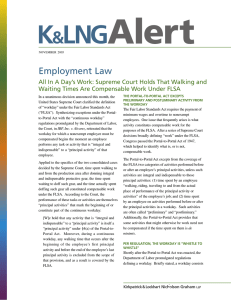11.11.2005 United States Supreme Court Finds Walk Time Between
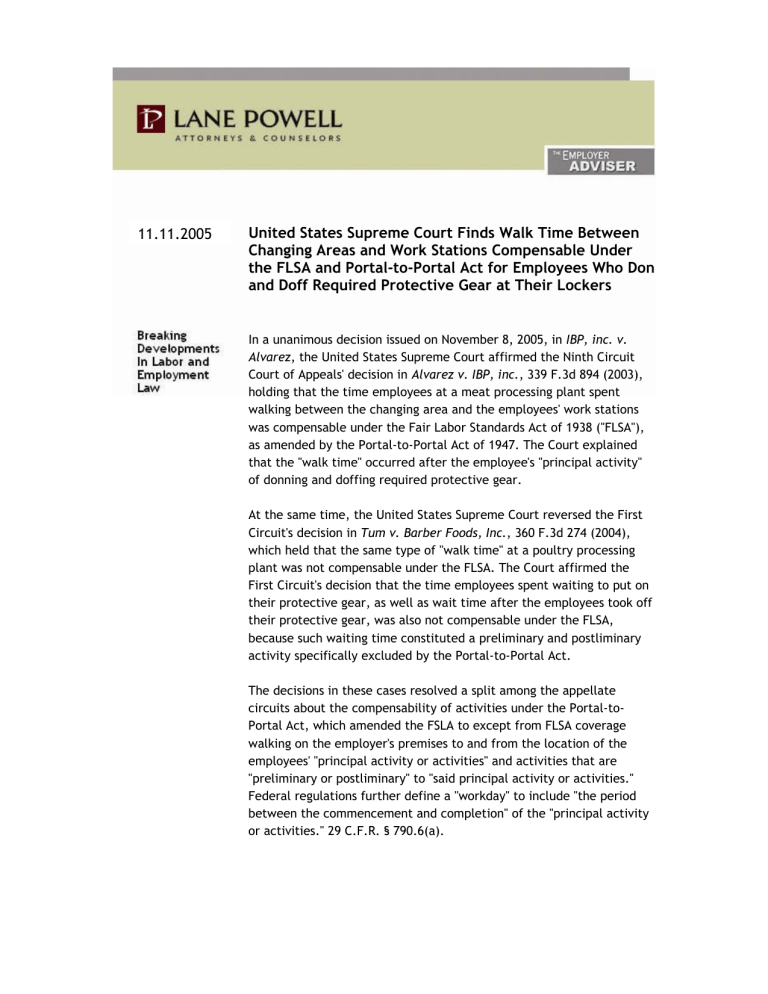
11.11.2005
United States Supreme Court Finds Walk Time Between
Changing Areas and Work Stations Compensable Under the FLSA and Portal-to-Portal Act for Employees Who Don and Doff Required Protective Gear at Their Lockers
In a unanimous decision issued on November 8, 2005, in IBP, inc. v.
Alvarez, the United States Supreme Court affirmed the Ninth Circuit
Court of Appeals' decision in Alvarez v. IBP, inc., 339 F.3d 894 (2003), holding that the time employees at a meat processing plant spent walking between the changing area and the employees' work stations was compensable under the Fair Labor Standards Act of 1938 ("FLSA"), as amended by the Portal-to-Portal Act of 1947. The Court explained that the "walk time" occurred after the employee's "principal activity" of donning and doffing required protective gear.
At the same time, the United States Supreme Court reversed the First
Circuit's decision in Tum v. Barber Foods, Inc., 360 F.3d 274 (2004), which held that the same type of "walk time" at a poultry processing plant was not compensable under the FLSA. The Court affirmed the
First Circuit's decision that the time employees spent waiting to put on their protective gear, as well as wait time after the employees took off their protective gear, was also not compensable under the FLSA, because such waiting time constituted a preliminary and postliminary activity specifically excluded by the Portal-to-Portal Act.
The decisions in these cases resolved a split among the appellate circuits about the compensability of activities under the Portal-to-
Portal Act, which amended the FSLA to except from FLSA coverage walking on the employer's premises to and from the location of the employees' "principal activity or activities" and activities that are
"preliminary or postliminary" to "said principal activity or activities."
Federal regulations further define a "workday" to include "the period between the commencement and completion" of the "principal activity or activities." 29 C.F.R. § 790.6(a).
Factual Background: IBP, inc. v. Alvarez
IBP, inc. v. Alvarez involved hourly employees who worked in the slaughter and processing divisions of a meat packaging plant in Pasco,
Washington. The employees were paid from the arrival of the first piece of meat at their workstations to the departure of the last piece of meat from their workstations. Although the employees were given an additional four minutes of clothes changing time starting in 1998, they were not otherwise compensated for any preproduction or postproduction activities.
The production workers in both divisions were required to wear protective gear such as outer garments, hardhats, hairnets, earplugs, gloves, sleeves, aprons, leggings, and boots. Other production workers, particularly those who used knives, were required to wear additional protective gear such as chain link metal aprons, vests, plexiglass armguards, and special gloves. The employees were required to store their protective gear in company locker rooms, where most employees donned and doffed the protective gear.
The United States Supreme Court granted certiorari in the Alvarez case to review the district court's holding (affirmed by the Ninth Circuit) that, for employees who were required to don and doff unique protective gear, the time spent by such employees walking between the locker rooms and the production floor was compensable under the
FLSA.
Factual Background: Tum v. Barber Foods, Inc.
Tum v. Barber Foods, Inc. involved hourly employees who worked in a poultry processing plant in Portland, Maine. The employees were paid by the hour from the time they punched in to computerized time clocks located at the entrances to the production floor. The poultry processing employees were required to wear various combinations of protective gear, which they put on before punching the clock.
The First Circuit agreed with the Magistrate Judge that walk or wait time prior to donning or after doffing of the protective gear was not compensable under the FLSA, because they were preliminary or postliminary activities specifically excluded by the Portal-to-Portal Act.
The First Circuit similarly held that walk time between the production floor and the changing rooms was not compensable. The United States
Supreme Court granted certiorari in the Tum case to review both of these decisions by the First Circuit.
United States Supreme Court Makes Clear That Walking Time and
Waiting Time After Donning and Before Doffing Unique Protective
Gear Are Compensable Activities Under the FLSA and Are Not
Excluded by The Portal-to-Portal Act
In these two cases, the United States Supreme Court expanded liability under the FLSA nationwide to include the employees' walking time from changing rooms to the production floor when the employees are required to don and doff unique protective gear. In Alvarez, the Court first rejected IBP, inc.'s argument that such time was excluded from
FLSA coverage as "preliminary or postliminary" activities by the Portalto-Portal Act. The Supreme Court agreed with the Ninth Circuit that the term "principal activity or activities" in the Portal-to-Portal Act embraces all activities which are an integral and indispensable part of the principal activities. The Supreme Court also agreed with the Ninth
Circuit that, under the facts of the case at hand, the donning and doffing of unique protective gear constituted a "principal activity" within the meaning of the Portal-to-Portal Act because it was "integral and indispensable" to the employees' job. Relying on the continuous workday rule, the Supreme Court therefore concluded that "any walking time that occurs after the beginning of the employee's first principal activity and before the end of the employee's last principal activity is excluded from the scope of [the Portal-to-Portal Act], and as a result is covered by the FLSA."
For the same reasons it affirmed the Ninth Circuit in Alvarez, the
Supreme Court reversed the First Circuit's holding in Tum that walk time between the changing rooms and production floor for the poultry processing employees was excluded from the FLSA by the Portal-to-
Portal Act. However, in Tum, the Court refused to expand liability under the FLSA to time spent waiting before donning and after doffing protective gear:
. . . , unlike the donning of certain types of protective gear, which is always essential if the worker is to do his job, the waiting may or may not be necessary in particular situations or for every employee.
Further, the Court reaffirmed that time spent walking and waiting before donning and after doffing required protective gear "always comfortably qualif[ies] as a 'preliminary' activity" and is therefore specifically excluded from the FLSA by the Portal-to-Portal Act.
What This Means for Employers
• The Supreme Court's decisions in Alvarez and Tum confirm the practice that already existed in the Ninth Circuit following the
Ninth Circuit's Alvarez decision and extends that holding nationwide.
• Employers whose employees are required to don or doff any protective gear or equipment before and after their regular workshifts should still consult counsel to determine whether time spent by employees donning and doffing the protective items is compensable under the FLSA or whether it may be excluded as
"de minimis."
• Employers should also be mindful that, even where the time spent by employees donning and doffing required protective items may be considered de minimis, and therefore noncompensable, the associated walk time after the gear is "on" and before the gear is
"off" will still be compensable, because the donning and doffing of the required protective gear is still deemed a "principal activity" rather than "preliminary" or "postliminary" activity.
• Employers should also consult counsel to determine what pre- and post-shift activities, other than donning and doffing required protective gear, might constitute a "principal activity" and define the outer parameters of a "workday" for determining whether the
FLSA requires compensation be paid to the employee.
• And, in good news for employers, walking and waiting before or after a "principal activity" will still be deemed noncompensable.
For more information, please contact the Labor and Employment Law
Practice Group at Lane Powell:
206.223.7000 Seattle
503.778.2100 Portland employlaw@lanepowell.com
www.lanepowell.com
We provide Employer Adviser as a service to our clients, colleagues and friends. It is intended to be a source of general information, not an opinion or legal advice on any specific situation, and does not create an attorney-client relationship with our readers. If you would like more information regarding whether we may assist you in any particular matter, please contact one of our lawyers, using care not to provide us any confidential information until we have notified you in writing that there are no conflicts of interest and that we have agreed to represent you on the specific matter that is the subject of your inquiry.
© 2005 Lane Powell PC
Seattle - Portland - Anchorage - Olympia - London
Lawyers for Employers ®
